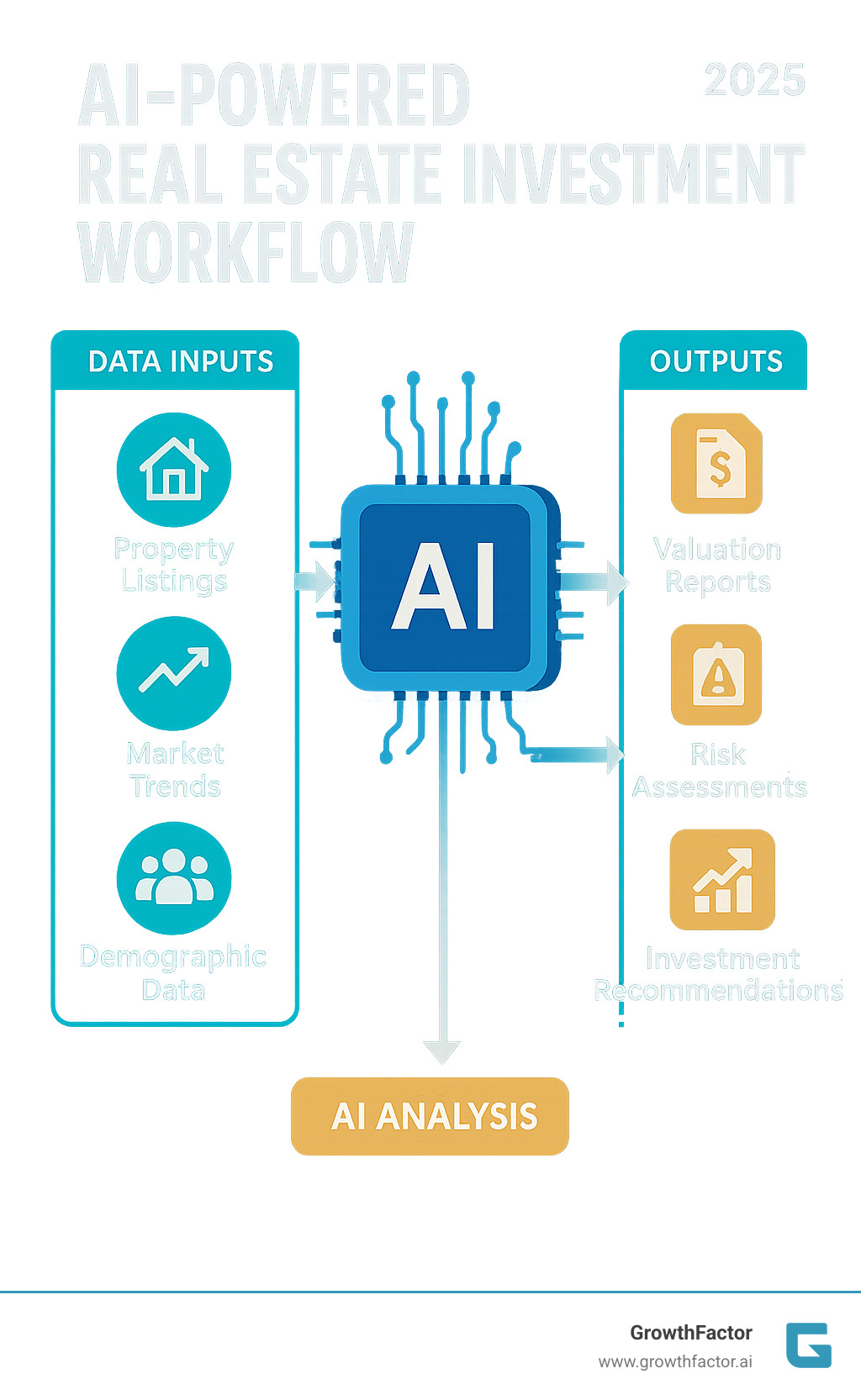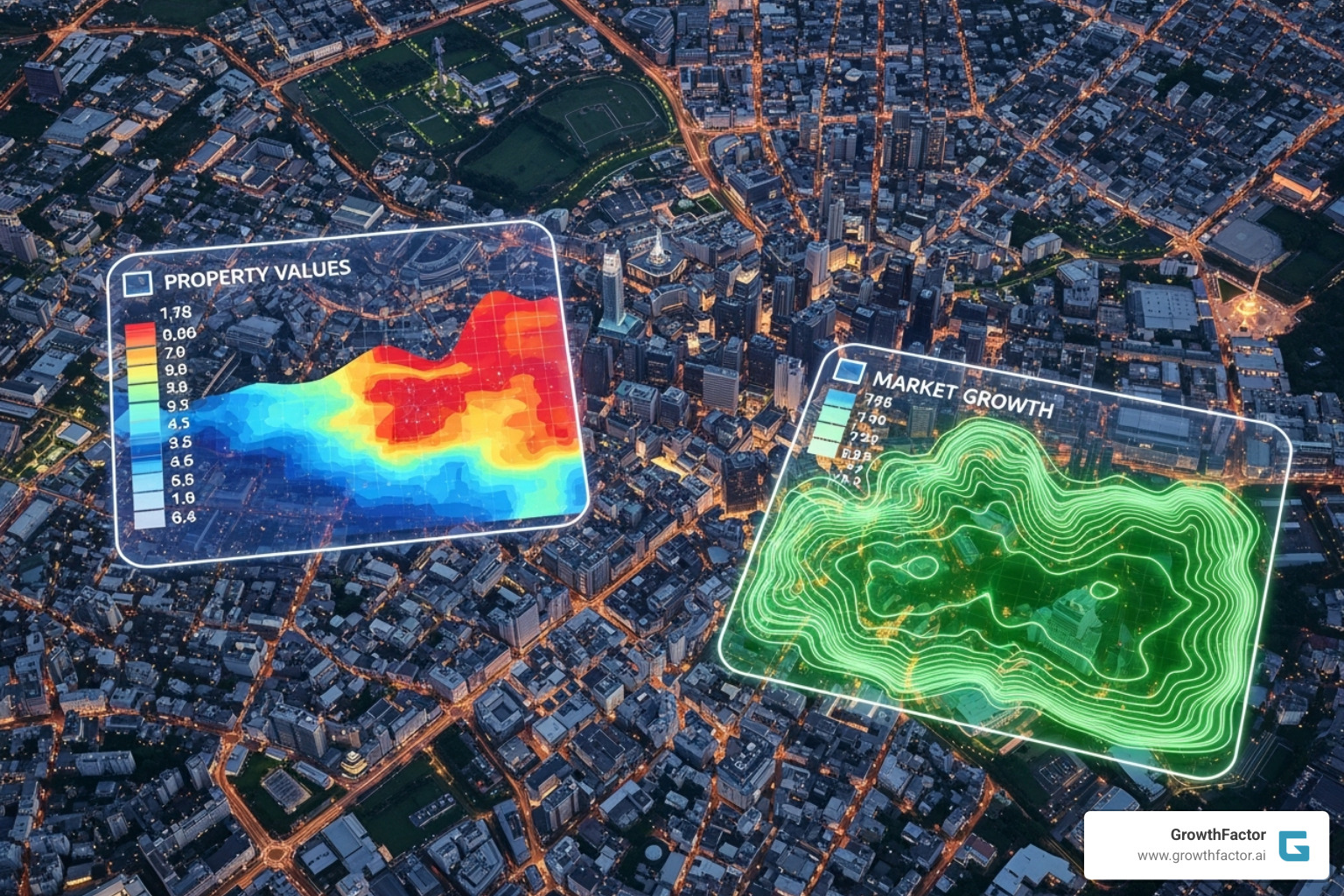Real Estate Investment AI: Your New Secret Weapon for Profitable Deals
Written by: Clyde Christian Anderson
Why Real Estate Investment AI is Changing the Industry

Real estate investment ai is revolutionizing how investors find, analyze, and manage property deals. Here's what you need to know:
Key AI Applications:
- Property Valuation: 98% accuracy rate in predicting sale prices
- Market Analysis: Identify emerging markets before competitors
- Deal Sourcing: Automate screening of thousands of properties
- Financial Modeling: Generate pro-forma projections in minutes
- Risk Assessment: Predict market trends and potential issues
Major Benefits:
- Speed up site planning by 4-10x
- Increase returns by 3% or more
- Reduce manual work by up to 37%
- Process deals in hours instead of weeks
The numbers are compelling: AI innovations could generate $34 billion in efficiency gains for the real estate industry by 2030. Forward-thinking firms already harness AI to evaluate sites in real time, and modern valuation models now achieve median error rates as low as 2–3%.
"I've been doing commercial real estate since the early 80's, and doing all the analysis myself, but with GrowthFactor coming on we've been able to expand much faster, make quicker decisions, whether its traffic count or demographics, we don't have to dig." - Mike Cavender, Co-Owner and Head of Real Estate at Cavender's
I'm Clyde Christian Anderson, CEO of GrowthFactor.ai, and I've seen this change firsthand. We recently helped customers analyze over 800 Party City locations in under 72 hours during their bankruptcy auction. This guide will show you how to leverage AI to gain a competitive edge.

What is Real Estate Investment AI and Why is it a Game-Changer?
Imagine a brilliant analyst who never sleeps, makes no calculation errors, and can process thousands of property deals in the time it takes to grab a coffee. That's real estate investment ai.
At its core, real estate investment ai uses machine learning and predictive analytics to turn property data into actionable insights. It's a super-smart investment partner that spots patterns in market trends, demographic shifts, and property values that would take human analysts weeks to uncover.
While relationships and gut instinct remain crucial, the industry is shifting toward data-backed decision making. AI brings unprecedented speed and accuracy to a traditionally slow-moving industry, and with roughly 37% of tasks performed by commercial real estate firms being automatable, this isn't about replacing human expertise. It's about freeing up your time to focus on strategy, negotiation, and building relationships.
This shift from gut-feel to data-driven insights is giving forward-thinking investors a massive competitive advantage.
For more insights on how AI is reshaping the property sector, check out our detailed analysis on AI for Real Estate.
From Manual Spreadsheets to Automated Insights

We've all been bogged down by spreadsheets, where hours of manual data entry can be derailed by a single formula error. By the time it's fixed, a great deal might be gone. The old way was slow and error-prone, with days spent crunching numbers instead of closing deals.
Real estate investment ai flips this process. Modern AI platforms can upload and analyze a rent roll in seconds, set up complex financial models in under 10 seconds, and calculate key metrics like cash flows, IRR, and cap rates in just three seconds.
This automation transforms your workflow. Instead of being buried in spreadsheets, you can focus on high-value activities: negotiating better deals, developing strategic relationships, and identifying emerging market opportunities. You can evaluate more deals, respond faster, and make decisions with confidence.
The Core Benefits for Modern Investors
The shift to real estate investment ai is about fundamentally improving how you invest.
Accuracy reaches new heights, with AI valuations achieving up to a 98% accuracy rate compared to actual sale prices. This precision gives you confidence in your decisions.
Speed becomes your competitive weapon. Analysis that once took weeks can now be done in minutes, allowing you to capitalize on opportunities before your competition.
Scale transforms your reach. Analyze entire markets, not just single properties, and manage larger portfolios without proportionally increasing your workload.
Risk mitigation gets smarter. AI identifies potential red flags and predicts market shifts, helping you avoid costly mistakes.
Hidden opportunities surface naturally as AI spots subtle patterns that human analysis might miss, uncovering undervalued properties and market inefficiencies.
The bottom line? Studies show that AI-driven recommendations can increase returns by 3 percent or more. This combination of benefits leads to significantly improved investment performance.
Supercharging Analysis: How AI Revolutionizes Valuation and Market Insights

Property valuation once relied heavily on gut instinct. Real estate investment ai has transformed this process into a precise, predictive science. AI acts as a powerful research assistant, aggregating millions of data points to provide hyper-accurate valuations and forecasts, giving human judgment the best possible foundation.
The fusion of human expertise with AI's analytical power is what keeps successful investors ahead of the curve. For a deeper dive into how data intelligence is reshaping the industry, check out our insights on Real Estate Data Intelligence.
Hyper-Accurate Property Valuation with AI
Automated Valuation Models (AVMs) powered by AI have revolutionized property valuation. These AI systems use machine learning to analyze billions of data points simultaneously, including historical sales, property characteristics, real-time market data, local economic indicators, and even digital photos to assess renovation quality.
They also consider environmental factors like proximity to amenities, school districts, and crime rates. The accuracy is remarkable: recent studies report that AI valuations can achieve up to a 98 percent accuracy rate compared to actual property sale prices. Even more valuable, these systems can predict future value changes, giving investors a powerful tool for strategic planning.
Predictive Market Analysis and Trend Forecasting
This is where real estate investment ai gets really exciting. AI can spot emerging market opportunities with incredible precision by analyzing patterns that humans might miss. It tracks demographic shifts, economic indicators, infrastructure projects, permit filings, and online search trends to gauge rising interest in specific neighborhoods.
Some systems even analyze social media sentiment to understand public perception and buzz around certain areas. By processing all this information, AI can pinpoint areas ripe for gentrification, uncover growth corridors before they become mainstream, and help investors understand the unique investment potential of any location. This enables proactive, rather than reactive, decision-making.
To explore how AI is revolutionizing location analysis, dive into our insights on AI Location Intelligence.
The Investor's AI Toolkit: Key Platform Categories

The ecosystem of real estate investment ai tools can feel overwhelming, but it's best understood as a specialized toolbox. Different platforms excel at different tasks—from deal sourcing to financial analysis and property management—offering sophisticated capabilities at every stage of the investment journey.
For a comprehensive overview of how AI is being deployed across the real estate spectrum, check out our article on AI-Powered Real Estate.
Tools for Deal Sourcing and Finding Opportunities
Finding the right property once meant sifting through endless listings. Real estate investment ai changes that. Modern deal sourcing tools can scan millions of listings in seconds, filtering by your specific criteria like cap rate or ROI. They can also uncover off-market deals by analyzing public records and other data sources to find motivated sellers before a property is even listed.
The AI can filter by your investor profile, understanding your risk tolerance and preferences to serve up relevant opportunities. Automated deal alerts notify you instantly when a matching property becomes available. This is where GrowthFactor's AI Agent Waldo excels for retail real estate, helping teams evaluate five times more sites efficiently. The result is less time sifting and more time evaluating promising opportunities.
To see how this change is playing out in retail specifically, read about How AI is Revolutionizing Retail Site Selection.
Platforms for Financial Modeling and Underwriting
Traditionally, financial modeling was a painstaking process of manual data extraction and complex spreadsheet building, prone to costly errors. AI platforms have turned this into a fast, automated process. They automate data extraction from leases and financial statements with remarkable accuracy.
These platforms then generate pro-forma projections instantly, creating detailed financial models based on integrated market data. The AI can stress test your assumptions, running multiple scenarios to show how changes in interest rates or vacancy might impact your IRR. They also provide instant valuations, calculating crucial metrics like NOI and cap rate in seconds. This transforms underwriting from a multi-day ordeal into a task completed in minutes.
To dive deeper into how AI is streamlining this crucial process, explore our article on AI Real Estate Underwriting.
AI for Property and Portfolio Management
Real estate investment ai continues to add value long after a deal closes, offering powerful tools for property and portfolio management. AI can optimize dynamic rent pricing by analyzing market demand and comparable rents to maximize income. It enables predictive maintenance by using sensor data to anticipate equipment failures before they happen, preventing costly emergency repairs.
These platforms also identify underperforming assets by continuously monitoring performance and flagging properties that aren't meeting targets. Operationally, AI can streamline tenant communications through chatbots and assist with automated rent collection. Smart home technologies let you monitor a house in real time, tracking everything from energy use to maintenance needs. At the portfolio level, AI provides a consolidated risk assessment, helping you make strategic decisions about diversification and exposure.
For more insights on how AI is changing this critical area, check out our guide on Property Management AI Tools.
Streamlining the Deal Flow with Real Estate Investment AI
The traditional real estate investment workflow can feel like running through quicksand. Real estate investment ai transforms this journey, streamlining the process from property identification to closing into a highly efficient workflow. It's an upgrade from a horse-drawn carriage to a high-speed train.
In today's market, sticking to old-school methods puts you at a serious disadvantage. As we explore in Your Broker is Using a Flip Phone in an AI World, the landscape has fundamentally changed, and those who adapt will thrive.
From Tedious Screening to Automated Opportunity Matching
Instead of tedious manual screening, AI provides automated opportunity matching. Our AI Agent Waldo can analyze thousands of deals, learning your investment profile, risk tolerance, and capital constraints. It then filters massive amounts of data to present only the deals that truly align with your strategy.
This personalized approach means you're no longer wasting time on properties that don't fit. The AI prioritizes qualified leads based on profitability and strategic alignment, allowing you to focus your energy on the deals that matter most. It's like having a personal shopping assistant for real estate.
Accelerating Underwriting and Due Diligence
The underwriting and due diligence phase, traditionally a mountain of paperwork, is dramatically accelerated by AI. Automated document review means AI can scan and extract key information from unstructured data like lease agreements and financial statements with incredible speed and precision.
More importantly, AI identifies red flags that human eyes might miss, such as zoning issues, environmental risks, and regulatory compliance problems. It then compiles everything into comprehensive reports, turning a weeks-long ordeal into a process that takes minutes. This acceleration is invaluable for firms managing complex portfolios, where it can be the difference between success and missed opportunities. Learn more about our Solutions for Private Equity Portfolios.
Optimizing Portfolio Performance and Financials
Post-closing, AI provides the tools to continuously optimize portfolio performance. Dynamic rent pricing analyzes market demand to recommend optimal rental rates and maximize income. The AI also acts as an early warning system, identifying underperforming assets before they become serious problems, allowing for timely intervention.
Cash flow forecasting becomes incredibly accurate as AI factors in various market scenarios. The technology can suggest where to re-allocate capital for maximum returns and identify opportunities to improve operational efficiency, from energy consumption to maintenance schedules. This gives you a real-time, bird's-eye view of your investments, enabling agile decisions that drive profitability.
For deeper insights into how AI is revolutionizing this space, explore our guide on Commercial Real Estate Portfolio Management Software.
Navigating the Challenges and Future of AI in Real Estate

Real estate investment ai is not a magic wand; it comes with challenges. Understanding these is the first step to navigating them and capitalizing on the opportunities of this fundamental industry shift.
We're witnessing a change in how the entire real estate ecosystem operates. For a fascinating look at how AI is creating entirely new concepts of intelligent properties, explore our insights on AI Properties.
Key Challenges and Risks of Adopting Real Estate Investment AI
Every transformative technology has growing pains, but most are manageable with the right approach.
Data quality and bias remain the biggest hurdle. The saying "garbage in, garbage out" is critical; AI learning from biased data will perpetuate those biases. The solution is to ensure we feed it clean, comprehensive, and fair data.
Implementation costs can seem daunting, but the long-term value far outweighs the initial expense. At GrowthFactor, we offer flexible plans starting from Core ($500) and Growth ($1,500), with Enterprise plans available to meet different organizational needs.
Data privacy and security are valid concerns. The key is working with platforms that prioritize robust security protocols and comply with regulations like GDPR.
The fear of job displacement is common, but the reality is more nuanced. The World Economic Forum predicts automation will create a net increase of 58 million jobs. AI replaces tedious tasks, not people, creating a "co-pilot" approach. This frees professionals to focus on high-value work like strategy, negotiation, and relationship building.
The Future is Now: Emerging Trends in Real Estate Investment AI
The pace of innovation in real estate investment ai is breathtaking. The trends emerging now will define the next decade of real estate.
Generative AI for reports is already amplifying human creativity by producing accurate market reports and property descriptions in minutes.
Hyper-personalization is taking investment matching to new levels, considering not just financial criteria but also lifestyle preferences and ESG priorities.
Integration with IoT and digital twins is creating fascinating possibilities. Smart building sensors feed data to AI for predictive maintenance and energy optimization, while digital replicas of properties allow for risk-free experimentation.
Perhaps most exciting is the rise of the fully autonomous AI real estate agent. While human expertise is irreplaceable, AI agents can handle initial client interactions, schedule tours, and draft offers. To see where this trend is heading, check out our insights on the AI Real Estate Agent.
Blockchain integration is also on the horizon, promising more secure and transparent transactions. These trends are happening now, creating a reimagined ecosystem that is more efficient and accessible.
Frequently Asked Questions about Real Estate Investment AI
We get tons of questions about real estate investment ai from investors who are curious but cautious. Let's tackle the most common ones.
Can AI replace real estate investors or agents?
The short answer is no. AI is a powerful co-pilot, not a replacement. It handles the data crunching, freeing you to focus on what humans do best: strategy, negotiation, and relationship building.
AI can't replicate the nuanced judgment, empathy, and trust required to close deals. It improves professional judgment; it doesn't replace it. It's like having a research team of 100 people working around the clock, allowing you to focus on the strategic and interpersonal work that drives success.
How accurate is AI in predicting property values?
Real estate investment ai can be incredibly accurate, with some models reaching up to 98% accuracy against sale prices. It achieves this by processing vast datasets—including comps, market data, and even photo analysis—to spot subtle patterns humans might miss.
However, AI isn't infallible. These models are based on historical data, so unexpected events can still be a factor. That's why we recommend using AI valuations as a powerful tool alongside professional expertise and traditional appraisals for the most robust assessment possible.
Is AI only for large institutional investors?
While large firms were early adopters, that's no longer the case. The rise of user-friendly, subscription-based platforms has democratized access to these powerful tools. Accessibility and affordability have improved dramatically.
With tiered pricing—like GrowthFactor's Core plan at $500 and Growth plan at $1,500—AI is leveling the playing field. Individual investors and smaller firms can now leverage the same data-driven insights as industry giants, making AI an essential tool for anyone seeking a competitive edge. Whether you're analyzing your first duplex or managing a large portfolio, real estate investment ai can help you make smarter, faster decisions.
Conclusion: Your New Competitive Edge in Real Estate
The real estate investment landscape is evolving rapidly, with real estate investment ai as the driving force. As we've seen, AI delivers a decisive edge, from 98% valuation accuracy to identifying emerging markets. It transforms weeks of manual analysis into minutes, enabling investors to increase returns and evaluate far more deals.
In today's market, AI is no longer a luxury; it's a necessity. It automates tedious work, freeing you to focus on strategy and negotiation. Adopting a data-driven approach is essential to stay competitive while others struggle with outdated methods.
At GrowthFactor, we built our AI Agent Waldo to empower retail real estate teams like yours. Waldo helps you evaluate five times more sites efficiently, automating the qualification and evaluation processes that used to consume your time. No more spreadsheet purgatory—just clean, actionable insights that help you make confident decisions quickly.
Our clients are closing more deals and building stronger portfolios. With flexible pricing starting at Core ($500) and Growth ($1,500) plans, plus Enterprise options, there's a solution that fits your needs.
The question isn't whether AI will reshape real estate—it already has. The question is whether you'll lead this change or watch from the sidelines. Your next great deal might be just one AI-powered analysis away.
Ready to transform your investment strategy? Find how Waldo, the AI Agent for Retail Site Selection, can transform your investment strategy and find what real estate investment ai can do for your portfolio.
Citations
The human algorithm
Request Your demo
Schedule meeting
Or submit your information below and we'll be in touch to schedule.



